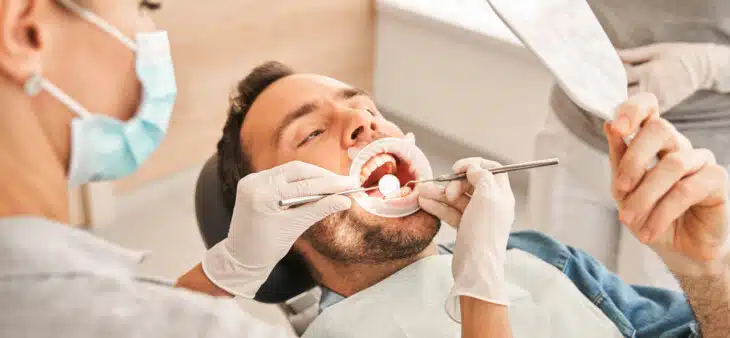
Gum disease, or periodontal disease, is a common dental issue affecting 47.2% of adults over 30 in the U.S. Left untreated, it can lead to more severe complications, including dental abscesses and tooth loss. Knowing how to prevent and treat gum disease is crucial for maintaining a healthy smile.
What is Gum Disease?
Gum disease is an inflammation of the gums that can advance to affect the bone and periodontal ligaments surrounding and supporting your teeth. There are two main stages:
- Gingivitis: The earliest stage of gum disease, causing inflammation and redness. At this stage, damage can still be reversed since the bone and tissue holding the teeth in place aren’t yet affected.
- Periodontitis: If gingivitis is not treated, it can progress to periodontitis. At this stage, the supporting bones and fibers holding your teeth are severely damaged. Pockets form below the gum line, attracting more bacteria and worsening the condition of your gums.
Causes of Gum Disease
The leading cause of gum disease is the buildup of plaque, a sticky film of bacteria. If not removed with regular brushing, this plaque hardens into a calculus called tartar. Tartar irritates the gum tissue and causes inflammation and gum recession. Factors that can increase your risk of plaque and tartar development include:
- Smoking or chewing tobacco
- Hormonal changes in women during menopause or pregnancy
- Diabetes
- Medications that reduce the production of saliva, leading to dry mouth
- Illnesses affecting the immune system
- Poor nutrition
Symptoms of Gum Disease
Recognizing the early signs of gum disease is crucial for timely intervention and treatment. By being vigilant about changes in your oral health, you can take proactive steps before the condition worsens. Common symptoms include:
- Red, swollen, or sore gums
- Bleeding gums while flossing or brushing
- Gums pulling away from teeth
- Persistent bad breath
- Loose teeth
- Changes in the way your teeth fit when you bite
Treatment of Gum Disease
If you think you might have gum disease, don’t wait—book an appointment with your dentist as soon as possible. Catching it early can make a big difference in treatment. Depending on how advanced the disease is, your dentist will recommend the best approach for you.
- Professional cleaning: The simplest form of treatment. This might be all you need if the disease is in its early stages.
- Scaling and root planing: A thorough cleaning technique that eliminates plaque and tartar from above and below the gum line and smoothes out uneven areas on the tooth root.
- Medications: Medications like antibiotic gels, fibers, or chips may sometimes treat gum disease.
- Surgical treatments: Flap surgery or bone and tissue grafts might be necessary in advanced cases.
Prevention of Gum Disease
Proper oral hygiene is the best way to prevent gum disease. The following tips can help you protect your smile:
- Regular dental cleanings: Visiting your dentist regularly for a professional cleaning is crucial. Tartar cannot be removed by brushing alone. Your dentist needs to use a hand-held or ultrasonic scaler to loosen and remove the calculus without damaging the underlying enamel.
- Brush twice daily: Fluoride toothpaste will help remove plaque and remineralize and strengthen teeth.
- Floss daily: Flossing removes food particles and plaque from between teeth and along the gum line.
- Mouthwash: An antiseptic mouthwash can help kill bacteria that cause plaque.
- Diet: Eating a balanced diet ensures you get essential nutrients. Avoid sugary snacks and beverages.
- Avoid tobacco: Smoking and chewing tobacco are risk factors. Tobacco products restrict blood flow to gums, impairing their ability to heal. They also introduce toxins, exacerbating inflammation and bacterial infections.
Support Your Gum Health
Gum disease is more than just a dental concern; it can impact your overall health. Regular dental check-ups and good oral hygiene practices can help prevent and detect gum disease early. Always consult with your dentist about any concerns regarding your gum health.
